#there are a lot of little differences in the spanish (latin) version and in the english version that make me love both more
Text

i love that in the english version of puss in boots the symbol he makes is a p for puss
but in spanish it's a G for Gato con botas
#im obssesed with this movie#there are a lot of little differences in the spanish (latin) version and in the english version that make me love both more#i haven't watched the spanish (spain) version yet#but now i HAVE to#puss in boots the last wish#puss in boots#puss in boots 2
134 notes
·
View notes
Note
So you know how in (non-British) English we perceive British accents to be ""fancy"" and ""proper""? Is it like that in Spanish? Is the Spain-Spanish accent ""fancy""? Is there an equivalent?
Yes and no
The Spain-Spanish accent that is considered more formal is called castellano which - if you learn Spanish in school sometimes that's what they call it. You sometimes hear el español "Spanish" or you hear el castellano which is literally "Castilian" but it's understood as "proper Spanish"
It's more like if you had English vs. "The Queen's English"
Spain has many different accents, and some can come across as very pijo [which is "posh" in Spain], or ... culto which is like "learned" or "high-brow", and others are considered more everyday; though people not aware of the accent differences will hear the C/Z in Spain lisped or see a vosotros and the closest analogy is like being from the US and hearing a British person talk... not specifically fancy per se, but definitely it has a different feel to it
...
But anyway, when I speak to Latin American people I warn them that I learned castellano so my Spanish comes off as a little formal at times and it's not me trying to sound arrogant lol
That's also something that sort of comes across when you have kids from Spanish-speaking families who are taking Spanish classes, because they know regional or "incorrect" Spanish at least to hear in a lot of cases vs. castellano that is considered "proper" and the spellings/grammar are a bit different
...
So castellano is considered the fancier official one
And here's where I might go on a bit of a tangent so bear with me
That being said not all European Spanish is considered fancy, sometimes it's regional - like in general "universal" Spanish the word for "olive" is la aceituna - that's the word they teach you for general Spanish/castellano in the US at least
And unless you're saying el aceite de oliva "olive oil" you generally don't come across la oliva often [with some caveats]
[Not that you asked but el aceite "oil (from a plant)" is directly related to Arabic's word for "olive" which came as la aceituna - that's how prevalent it was... the Romance Language version of "oil" is more like -óleo like el petroleo is "oil/petroleum" literally "stone oil" - the decision was that el aceite de aceituna is too redundant, so it turned to el aceite de oliva taking the more Romance Language word oliva instead of aceituna]
There are some people who consider oliva to be very fancy... but there are some regional dialects that use oliva more than aceituna - (probably because some of the Autonomous Communities are closer to the Mediterranean and have a closer relationship to France and Italy, or have historical ties to them)
Spain itself has distinctions between regional Spanish from the different areas in Spain, and there are stereotypes about regions and regional accents like you'd expect from everywhere
48 notes
·
View notes
Note
One of the worst YA books that is bad "ownvoices" that I've personally read was Cemetery Boys, and it's a great example of how silly ownvoices as a term has become because the author is of some degree of Latine descent and nonbinary, but it was really clear they didn't speak Spanish at all because they were absolutely obsessed with doing the "Latinx" thing with every gendered Spanish word, to the degree that because it was about magic users, I had to read the word "brujx" multiple times per page in some chapters....
Like, you know, maybe a label such as "ownvoices" should be based on something a little more than just belonging to the same broad demographic groups as your characters. I'm not saying that writing should only be autobiography, but I was honestly shocked a gringo (gringx?) hadn't written it and I'm not sure that their representation was any more "authentic" (I'm sure it involved some research, but it wasn't their personal cultural experiences) than one written by a non-Latine person. That doesn't make it a bad book; plenty of great books are written by people from different cultural backgrounds as their characters. But I'm not sure it's really "ownvoices" is what I'm saying, and it makes me think about how I feel like that label is becoming more about representing a specific kind of POC/LGBTQ+/etc. "experience" that (predominantly white and straight) publishers want to see, than actually reflecting its authors' ACTUAL life experiences as the term would imply?
It reminded me of a point a lesbian mutual made about how if she were to write a book about a lesbian teen going through conversion therapy, that would require just as much research for her as it would for a straight author because she never went through conversion therapy and had a largely accepting family and social environment from an early age. But if she were to write a book about that, not only would it be praised as "ownvoices" but a lot of people would ASSUME it was based on her own experiences unless (or even if) she said otherwise, whereas a straight cis woman writing an identical book would be raked over the coals in the current discourse environment....
--
Brujx? BRUJX?!?!
And yes, I've seen plenty of people complaining about how they only get approached for ~ownvoices~ stuff and how they're expected to write about plantains and colonialism, not whatever actually moves them.
What was supposed to be a chance for people to at least get a foot in the door past the slush pile has turned into another straitjacket and double standard for people not seen as the default.
Not that we should stop asking who the author is and if they did their research/knew what they were talking about in the first place, but the hashtaggy version has gone awry as these things frequently do.
As usual, we focus more on things like book content than on employment equality behind the scenes. The really significant thing is to diversify who has power. They can make their own damn decisions what to do with it.
89 notes
·
View notes
Text
The Isle- Languages and Accents
In the United States of America, the main language is English and the main accent is American. However, that poorly represents the actual linguistics of the country. Different areas have different main secondary languages and accents, such as Southern California's main secondary language being Latin Spanish and the main accent is actually California English, which is an entirely different thing from the general American accent.
Like the United States, the Isle has different secondary languages and accents depending on the area, referred to as districts. While the entire Isle can be summarized by "The main language is English and the main accent is a Toronto accent," but that does little to actually represent the Isle. To look at languages and accents on the Isle, one needs to look at each district and which cultures and groups have settled there because it's so much more diverse than English with a Toronto accent. And English with a Toronto accent is far too brief an explanation for even those two general details.
The English spoken on the Isle is a mix of American and British English. As "pop" and "soda" mean the same thing and are used interchangeably in America, differences such as "pants" and "trousers" are used with few genuinely caring about the difference between the two words. Isle English even has its own words, most commonly insults, that make it its own unique version of English.
The Isle accent sounds closest to a Toronto (Tarahno) accent, but with a slight stress on vowels and little energy put into consonants. The Isle accent also includes a distinct drawl, something that makes it sound constantly sarcastic. This accent is almost universal on the Isle. It may be lighter in some people for any number of reasons, but one would be hard-pressed to find someone on the Isle without even the slightest Isle accent.
Each district on the Isle has its own unique set of secondary languages and accents commonly encountered. Some districts, like Far Shore and the Barricade, even have smaller districts within them where the languages and accents are completely different. The districts on the Isle are as follows- Far Shore (Harriet's territory,) Villain's Claim (mostly Mal's territory, but Diego owns what's closest to his territory,) Barricade (Diego's territory,) Thieve's District (Cassim's territory,) Shadowland (Facilier's territory,) Kraken Coast (Uma's territory,) Falcon Ridge (Shan Yu's territory,) the Darklands (Mordred's territory,) the Underland district (part of Harriet's territory,) and the Wicked Wilds (unclaimed, no one fucks with the Wilds.)
As previously stated, Far Shore has two sub-districts, which I'll be referring to as Inland and Coast. Inland is where civilians from Eurasian countries (unless said civilian is POC or are part of some ethnic or religious minority, because they need more protection from Frollo's cult) usually settle. Coast is where people from Celtic countries (mainly Ireland, but you'll find a decent population from all six) settle. Languages in this district are Breton, Irish, Scottish Gaelic, and Welsh, with a bit of Cornish and Manx
Inland, however, you'll find a mix from pretty much every country. The population is mostly European- minorities on the Isle need more protection than Harriet can provide- but you'll still find languages and accents from Asia, India, Africa, and the Americas. Different cultural groups in this area tens to group together, creating almost sub-districts. Some languages, like French or Russian, have enough speakers to have their own sub-district, but others, such as Budukh, will share a sub-district with multiple other language groups that aren't well-represented in Harriet's district. There are thousands of languages represented in this district from all over the world.
-
Barricade, Diego's district, is where you'll find a lot of South American languages and accents. This district has a second main language, Latin American Spanish. You'll also find a few Indigenous groups here, though most of them take shelter in Uma's territory. This district also used to have a large Romani population, which still impacts languages and accents in certain areas, but Frollo found out and it was decided, for everyone's safety, that they would direct Romani arrivals to Facilier's territory.
The languages you'll find here are mostly Portuguese, Spanish, and some Creole. You'll find accents from all over South America.
-
Shadow District is Facilier's territory. This is where most dark-skin people need to live, because Frollo is a racist fool. In this district you'll find a lot of African, Indian, Asian, Middle Eastern, diaspora, and Papa New Guinea languages. There's a lot of variety here, because a lot of people in this district have decided to work towards preserving languages lost to colonization or even just the sands of time. The most common languages spoken here are Zulu, Xhosa, Hindi, AAVE, and Balkan Romani, and accents are an extremely mixed bag.
-
Thieve's District is Cassim's territory, and it's a haven for religious minorities. The population here is mostly either Muslim or Jewish, but you can find dozens, if not hundreds, of religious groups here. The most common languages are Arabic, Yiddish, and Jewish diaspora languages, but you'll find languages from everywhere on Earth. Accents tend to be Arabic variations or Yiddish.
-
Kraken Coast is Uma's district, home to Indigenous cultures from Oceania, the Americas, and Australia. This area used to be part of Facilier's territory, before he ceded it to Uma, and the people here share the hobby of preserving languages. The language and accent statistics for the area reflect this, with numbers too close to definitively call a most common language, other than Isle English.
-
Falcon Ridge is Shan Yu's territory, and this is where you'll find a lot of Asian cultures. There's a lot of Mongolian, but also sizeable populations who speak Mandarin, Korean, Japanese, Tibetan, and other Sino-Tibetan languages and accents.
-
Villain's Keep, Mal's territory, has a lot of Spain Spanish, British English, German, France French, etc. The largest linguist group here is French, and that's also a common accent in the area.
-
The Badlands, a territory caught in a war between Madam Mim and Mordred, has a lot of Welsh, but not naturally. People in this area had to learn Welsh to understand Madam Mim's soldiers in order to survive the constant turmoil of the region. Most of the population here was American, so American accents and American English are extremely common. You'll also find some Latin. And, if you look, even some Enochian.
-
As for the Forbidden Land, that's Maleficent's territory, No one lives there, are least not above ground, and no one visits. As far as the Isle is concerned, the only language there is the singing of the night frogs.
Little do they know exactly what hides beneath the surface
22 notes
·
View notes
Note
What do you think about languages? I mean clearly having different voice actors or god forbid the insinuation that any fairy tail character spoke a different language was too much.
Like Latin being something strictly the church speaks or diving deeper into the fact that everyone from Isvan spoke different languages or some characters have heavier accents than others?
Ramble time because I honestly love conceptualizing accents/tones for voices. Honestly just wish I had a better grasp on non English languages and how to craft fictional ones.
Turned out longer than expected.
I want to apologize in advance because my limited knowledge does mean I can't go as in depth with the specifics as I'd like to.
I love the idea of different kingdoms having different languages and them being evolved versions of languages that existed when Zeref was fully mortal. Similar to how Olde English is absolutely not something modern English speakers can understand.
I think the two characters who for sure knew a secondary language would be Juvia and Alzack. I go back and forth with Juvia because I happened to be one of the people who saw enough of the Animax dub for French Juvia to lock into my brain like an old friend. Though I'll admit Slavic Juvia holds a dear place in my heart. Either way Juvia has a heavy accent on her to me and often slips into her native tongue when her emotions are heightened. Alzack I imagine to speak something akin to Spanish. I did base his look slightly on Latinx clothes and little Asuka mimicking her papa in a way almost no one in the guild got is too cute to pass up.
Within the cast itself I think anything created by Zeref is born with a built in understanding of the language his people spoke when he was fully human. Meaning in this case both demons and dragon slayers would have that knowledge. I imagine the language. I think Midian was very clearly based on ancient Greece so for me I imagine characters connected to zeref with a language similar to that. I think Zeref himself would have a decent understanding of languages as they change but ultimately would be most comfortable in his Native tongue. The concept of the dragon slayers meeting him and him slipping into it without them realizing he's speaking a new language because they understand it perfectly is such a fun concept.
In this same train I had actually been playing around with the idea of dragon slayers being incapable of learning to read modern script because of how different it was from their native language but instantly being capable of reading anything written in that Midian language.
Alvarez similarly I think would majority speak in an updated version of the Midian language, meaning anyone trying to go undercover would need a fair bit of understanding of the language.
As for the church: the more I think about it the more I do like the idea of them using latin/a language based on it because it adds even more interest to the lore. In the real world Roman's took and changed so much Greek culture when crafting their myths and Zeref having even more vitriol towards the church and its worship of the gods because he saw his country be pushed out and silence would've been insanely fascinating. I'm someone who struggles not to make organized religions corrupt within my stories so this only makes things more interesting.
I think everyone within the story speaking one language plays into soft fantasy ideas that we see a fair bit in media. Where the author either doesn't want to go through the trouble of working with people to add in language barriers or themselves doesn't know how to craft fictional languages. Though playing around with cultural differences and language clashing in a story provides a lot of opportunities for character depth.
Thank you for the question and I hope this is somewhat what you were searching for!
#molten rambles#fairy tail#ill admit i havent even broached coming up with ficitional languages in desecrate because it makes my head hurt#i wish i had a hyperfixation on creating false langages man#researching with adhd is horrible 😔😔#ask#gem-ini24
16 notes
·
View notes
Text
⚠️Long Post Alert⚠️
Alright I've seen a lot of (negative) buzz around Disney's new show "Primos" so I'm gonna put my 2 cents in
According to the Primos wiki, the show is about "Tater, an eccentric 10-year-old girl with big dreams and, unbeknownst to her, a certain “it factor” that makes her exceptional. When her 12 cousins (“primos” in Spanish) move in for the summer, they help her discover just what it is. Tater’s aspirations and larger-than-life imagination are seen via entries in her super-secret diary, which turn her deepest thoughts into grandiose animation sequences."
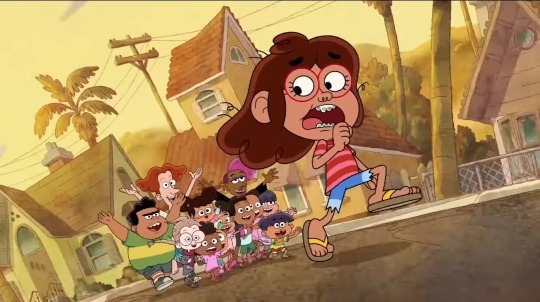
FIRST, it's yet ANOTHER piece of children's media about the main character + their large Latin American family.
Upon doing some research apparently this show is about the creator's personal experiences, which okay valid. But when creating media that meant to represent a community it would be better to offer a DIFFERENT perspective rather than give us the same trope that has been done to DEATH.

And I'm gonna be real with yall, I LOVE Coco and Encanto, but both movies also fall under this trope. Not all Latin American families live with their extended family, we don't need ANOTHER piece of media perpetuating the stereotype.
Also, Disney has been putting out a few shows on Disney Channel and Disney Junior that are clear knock offs of Nickelodeon shows. Some examples:
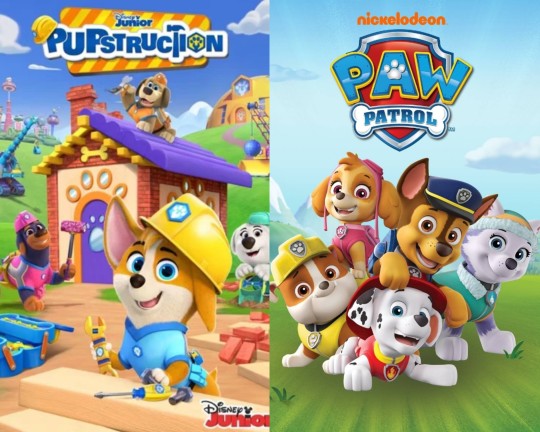

And...hm....lemme think....a kids TV show about a Mexican girl and her quirky large Mexican family getting into some Mexican™️ shenanigans...where have I seen that before...?
Oh right

Yeah the premises are slightly different, but it's essentially the same trope so already right off the bat Primos feels like a knock off version of The Casagrandes.
SECOND, there are many stereotypes already present in the series just from tbe opening theme. Many of the cousins fall into stereotypes themselves, particularly the names. Some the names of the cousins are Gordita, Big Nacho, Nachito, and Cookita. I've seen people justify the use of these names by saying many Latin Americans are given these names as nicknames, which is true. But then again, having a characters named Nacho and Gordita in a show that's supposed to be about LatAm representation is just in bad taste. It's giving "Marco Diaz from Star vs. the Forces of Evil being half Mexican and being obsessed with nachos for some reason but not representing his Latino heritage in any other way other than him wearing that Day of the Dead themed costume in The Blood Moon Ball ep." It feels lazy, and of course, stereotypical.
On TOP of this, the word "Cookita" in many LatAm countries is slang for pussy and the suffix "-ita" means small. And the character with this name is the BABY. So yeah maybe naming the B A B Y character something that to many Spanish speakers means "little pussy" in a show ABOUT Spanish speaking Latin Americans probably isn't the wisest decision.
Another detail people have been pointing out leans into negative Mexican stereotypes is the use of the "yellow filter".

Now I'm gonna be real and say I'm not 100% convinced about the yellow filter being used here. The show takes place over the summer, so the use of yellow might may be used to give the feeling of how hot it is, but I can totally see why Latin Americans would find this offensive.
Also the name "Terremoto Heights" has been heavily criticized. Terremoto means "earthquake" in Spanish and the earthquakes are common in LatAm countries. Then again, show takes place in LA, where a lot of earthquakes occur too. So Im not 100% convinced that this is flat out racist either, but it's definitely in poor taste.
THIRD, the thing that is being SLAMMED at the most, is the improper Spanish grammar and the creator's response to people pointing it out.
In the theme song, the phrase "¡Oye! Primos" is used a lot, which means "Hey cousins!" The issue with this phrase is that "Oye" means hey but in the singular tense, and "Primos" is plural. If you plug in "¡Oye! Primos" to Google translate you'll get Hey Cousins regardless, but in Spanish the phrase is not grammatically correct. In order for it to be grammatically correct the phrase would either need to be changed to "¡Oigan! Primos", "oigan" being the plural word for Hey, or "¡Oye! Primo" and make primo singular. People have been telling this to the creators of the series and well...they haven't exactly been taking it well.
Here's what the voice actress of the main character Tater, Myrna Garcia Velasco said her on social media (Instagram I think, I could be wrong) in response to the bad Spanish:
(If you can't listen to it I'll just summarize. Velasco says that Spanish is the language of the Spanish conquistadors and the only reason why Latinos are LATIN American and not indigenous is because of the Spanish, and to stay mad if you think her incorrect Spanish is an issue. She also brings up how they're "trying to make a good show" for kids who "don't have a grasp on any language" or something?? Idk that's pretty much what she's saying")
Basically this response doesn't make any fucking sense. "Spanish isn't our original language so it doesn't matter if I speak it correctly or not. I'm a NATIVE Mexican so it doesn't matter if I speak Spanish correctly or not"
???????
Girl what the fuck does this mean??? News flash, but the majority of Latin America has been speaking Spanish for CENTURIES. You go to Mexico or most other Latin American countries and you'll find them speaking SPANISH. Yes it's because of the Spanish but it's part of our culture now whether you like it or not. It's like saying "oh it doesn't matter if I speak English correctly or not cause English isn't the US' ORIGINAL language anyway" ?????
Now, the story IS about a mixed kid. Tater is half white half Mexican, so if Tater is a Latina girl who doesn't know Spanish fluently (otherwise known as a "No-Sabo" kid), then the imperfect Spanish would make sense. If the idea behind Primos is to represent the Latin American kids who don't speak Spanish, then yeah thats fine and it was a directoral choice. But judging by Velasco's response, that doesn't seem like thats the idea?? She immediately got defensive and brought up the Spanish colonizers?? Which is relevant??? HOW???
On top of that, one member of the creative team, (not 100% sure who) called someone a "Grammar N@zi" for pointing out the grammatical errors and, well...
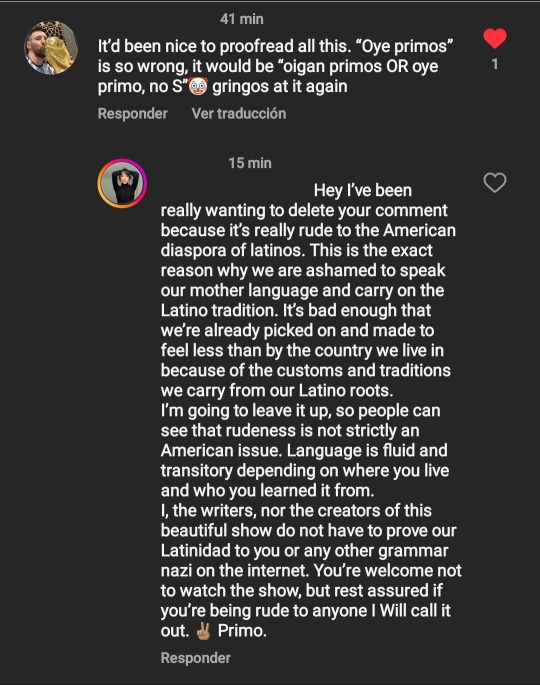
That's def not helping their case.
How the HELL are you gonna make show about a Spanish speaking Latin American family and NOT SPEAK SPANISH PROPERLY??? How the HELL are you gonna start beef with SPANISH SPEAKERS over whether or not it's important to speak Spanish CORRECTLY when portraying SPANISH SPEAKING PEOPLE IN MEDIA??? Yes slang exists, yes different LatAm countries speak Spanish differently, but grammar still exists??
OVERALL: Do I think Primos is this horribly racist dumpster fire? No. Are there MANY choices in this show that are just in poor taste? Absolutely 100%. Are the responses from the creative team outta pocket? Yes of course.
If you ask me, I think the main reason why people are so outraged over Primos is because the stereotypes and tropes are tired and dated, and people KNOW what writers are capable of. The response of this teaser, sandwiched between The Owl House ending and the premier of Across the Spiderverse, which have STELLAR LatAm rep, is proof of that. Luz Noceda, Miles Morales and Miguel O'Hara are SHINING examples of good SPANISH SPEAKING LatAm representation in children's media. We CAN have good LatAm protagonists in mediation, we've SEEN IT. We don't need all the stereotypes and overused tropes, so it makes sense why so many LatAm people feel like Primos is offensive and a step backwards.
Disney is getting lazy, they need to get their shit together
#Disney#disney primos#primos disney#primos#latin america#latino representation#latinos#poc rep#representation
85 notes
·
View notes
Note
What's the app you've been using to learn Portuguese, do you think it's good? I've been trying to find a decent alternative to Duolingo
I’m using the Mango app through my local library system! I believe that it’s paid, but my library pays for the subscription or whatever.
So far I like it. It isn’t a lot like Duolingo, like there aren’t any games or anything. It’s a lot of repetition and drilling, but I like it! It’s pretty good!
It does focus a lot on speaking and listening, which I think is good. There are little flash cards and bonus vocab sessions.
And! There are SO MANY LANGUAGES! It’s actually insane. Like, it’s even got different Spanish versions apparently for both Castilian and Latin American Spanish.
Regarding Portuguese specifically, it’s actually Brazilian Portuguese! Like. Just Brazilian Portuguese, and I think it’s great!
But, again. It is paid after your first lesson, but I think that a bunch of places will pay for it for you. My library does, so maybe yours does? Or your college or whatever, not sure what your circumstances are
9 notes
·
View notes
Text
Definitely gonna need to read lyrics for these songs, the music is so interesting.
Drum Beat
Straight off, great choice for title track, it's such a catchy, feel good song that sets up the pace for the rest of the album.
Onew's rapping is so good in this, it suits the song perfectly a highlight on a song full of great moments.
I love the outro, that kinda talky bit at the end sounds so nice I don't even know why but hm, hits just right.
I wish it was longer, I could listen to a five minute version of it, but I will have to settle for looping it ┐( ̄ヘ ̄)┌
Hola!
The vocal melody in the beginning of the verses reminds me a lot of latin american pop from the 70s and 80s. It's such a strange thing to me because the song instrumental itself (sans the percusion) is very different, taking sounds more specific to bosa nova, at least that is what it sounds like to me, I had not heard that combination before and gives me a strange sense of familiarity and nostalgia (at this point I was interrupted by Onew's live lol)
Made me wonder if the latin influence is on purpose, since the title is hola, if so 10/10 executed perfectly. Why haven't i heard any latin american artists do something like this?(if anyone has any recs for something that has this same kind of sound, in any language, but specially spanish please let me know)
Maestro
Contender for favorite on the album from the first listen, the bass line, the syncopation and how spacious? the chorus sounds. Floaty, idk you get what I'm saying?
The robotic voice too just fits the mood, the entire song is full of so many textures and layers, pulling forward and falling back, it's so engaging.
It reminds me a little of MGMT's Little Dark Age, but with the added charm of melodic breaks that are more grounded.
To say that I love it is just not enough.
Shape of My Heart
There is this sound in the background, that sounds to me like someone is carving/shaving ice? or perhaps sharpening a blade, i need lyrics for this one haha.
Either way the piano chords sound kinda out of tune at times, like a really old piano; or perhaps it's like a distortion —like the piano is coming in and out of focus, some chords are rattly, out of tune. This song has a lot of interesting stuff going on in the background.
The outro though, it feels like suddenly everything is finally sorted out, every element fits together by the end, the vocal melody, the chords on the piano stop sounding distorted, and it all sounds melodic and sweet. Also those backing harmonies to boost that feeling of order and peace, where before everything was extremely chaotic, going in and out of focus.
It sounds like resolution, i really need the lyrics for this one. I looped it a lot just to get this down, it's such an interesting sounding song.
월화수목금토일 (All Day)
Now I've been listening to this one quite a lot since it came out, and it still is such a feel good kinda song, which seems to be a thread through this whole album, it's so catchy no wonder he picked it for a pre-release.
It showcases his vocals beautifully, what else can I say?
Focus
The synths, the dramatic rests, come on.
I think Shape of My Heart took most of my brain power cause I'm struggling to come up with more than that, but it's a great song, great closer.
The instrumentals in the whole album compliment his voice perfectly, I can't imagine how hard it was to pick the title, half the songs in the album could be strong contenders for title.
I do wish the songs were a bit longer though, but that is just a teeny tiny thing, really.
I keep thinking about it and there is a lot of joy in this album, idk why i got that impression, because it's not like all the songs are happy, maybe it's just Beat Drum, All Day, and Hola!.
I love it so much.
It is just as 'Onew like' as Circle, even though it is so different.
I hadn't really realized how much I had missed him during this hiatus, and it seems to have hit me all at once now. I'm so happy that he is back and maybe that plays a role on it too.
It does seem like the ten months of rest did wonders for him and I can feel a huge amount of joy in the music. He seems to be really happy to be back making music again, and it shows in every second of this album.
He really seems to know how to express himself through music, and it's just wonderful to be here to witness it💖
5 notes
·
View notes
Text
differences between french, italian and german 1st chapter



i wanted to add the spanish and the brazilian versions too, but it was already a hassle to get the german and the italian ones.
anyway here's the first page in french, italian and german, surprisingly their colors are different. the contrast and the saturations and even the hues vary, even if by a little, but these are the ebook versions, maybe on paper they're different (the french one isn't very contrasted in particular). None of them replaced the original sound effects, only added the specific insects sounds for their language, not shoking as it's often done like this.
Ah something else i just noticed, french and italian still use the old version of hikaru’s shoes while the german edition uses the good one
I speak french, i can read italian and i don't know much more german than guten tag, so i can't really talk about the manner of speech of the latter 2 but in french it goes a bit like the english (yer instead of you/'re/r) with stuff like "j'peux" or "m'dame" (insteaf of "je peux" and "madame"). i think it work since these 2 languages don't really have a lot of dialects like japan does (i always say that if they were ever to translate kansai accent in romanian they should do in a moldavian way). As i was told, the german edition kinda sticked to the formal german (germany has a lot of dialects for every region). I can't pick up stuff about italian yet, so if you know more you can explain in a reblog



then of course it's hard to adapt word games in other languages. In japanese it was 'torture' and 'anus', written the same but with different pronunciation. Anyway, in italian yoshiki warns hikaru about his intonation, but i don't think the word has any other meaning based on the pronunciation. In french hiakru says "tortue" (turtle) instead of "torture" (still a thing abt pronunciation bcs you have to put weight on the r to make the difference). again, i don't speak german (my dutch is useless here welp) but it looks a bt more complex, maybe a mix in expressions, idk.

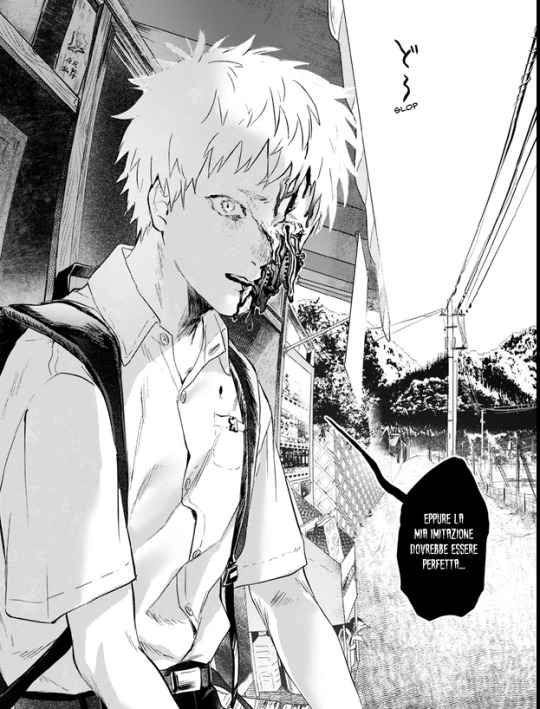

next is the reveal scene, french and german are like "i thought i was copying him perfectly" while italian is "i thought my imitation was perfect"
i think this is pretty much all i can say, i looked through the next pages, they seem identical more or less (yoshiki always avoids the girlfriend question hahaha)
oh wait wait wait update: here's something i could say more

the moment yoshiki stops calling Hikaru 光 but ヒカル (to differenciate hikaru and unuki)
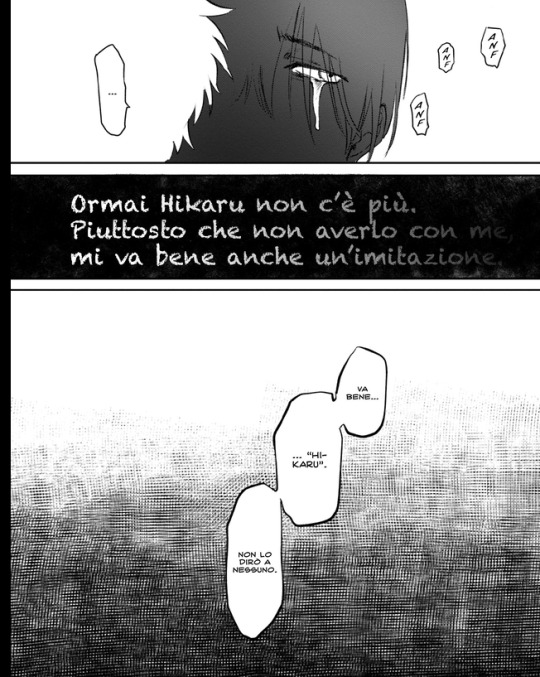
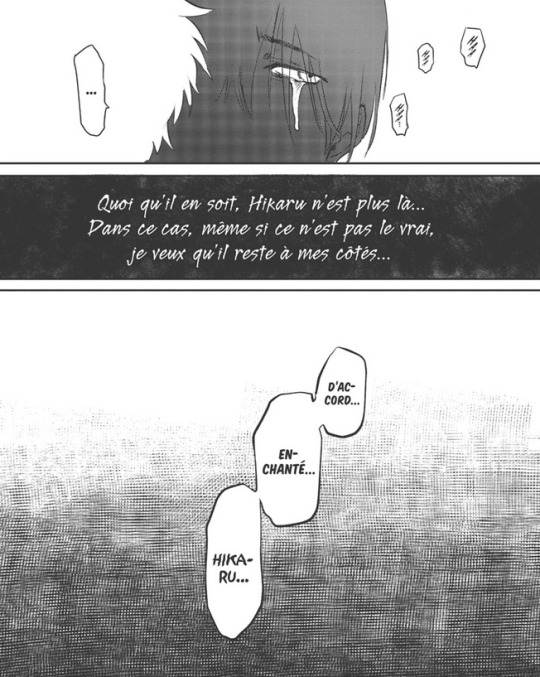

italian uses "", french changes the font, german doesn't really do anything. All start with "Hikaru is no longer" but the translations are different even if they lead to the same conclusion, italian says that "despite not being the real deal even a fake would be good", french says "even if he's not real i still want him next to me", and german i can guess it says something like "i want at least to have the fake hikaru"
im curious about the english translation next week
also y'all can reblog it in spanish (both latin and european) and portugese with these pages (you can get them from the amazon ebook sample which is free) bcs im curious how they look (and polish, but they don't have amazon)
#hikaru ga shinda natsu#the summer hikaru died#tsujinaka yoshiki#indo hikaru#mokumoku ren#mokmok len#hgsn translation
36 notes
·
View notes
Note
Spoken natively by half a billion people across twenty-some countries, Spanish will hit you with some rich linguistic differences.
For starters, soft C (ce and ci) and Z in most of Spain including Madrid and therefore the standard in the country; gets pronounced as /θ/, same sound as the TH in English found in words like thinking.
However, on the Canary Islands and in the Americas, soft C and Z get pronounced just like /s/, this phenomena gets called "seseo." This is why everyone you know in real life pronounces it like that. This is the way I speak it and most Spanish speakers do.
Countries have lots of different ways to refer to things. In Spanish class we even had parts of the course dedicated to explore the dialect differences of other nations for enrichment I guess.
You are not bad at Spanish here, it's just that sometimes the different peoples will have a whole different word for the same thing.
Let's look at the three words you mentioned.
BEAN 🫘
I call it "frijol" but other derivate words people use to refer to such legume are frejol, fréjol, fríjol, frijón, frisol, frísol and frisuelo.
Argentina, Uruguay, Bolivia, Paraguay and Chile call it "poroto"; depending on where you are on Spain, it will be "judía", "alubia", "faba" or "habichuela"; and in Venezuela it's "caraota".
SANDWICH 🥪
From the English word, some people will call it "sándwich"; or more closely appealing to Spanish's phonotactics: "sánguche". Some people will pronounce it as if the word was "changüich".
The word "emparedado" also exists. Spain calls it "bocadillo" but that same word in other countries can refer to a snack or a packed lunch. In some other countries, if it's for example a ham sandwich they will call it "pan con jamón". Some people that clearly don't understand Mexican gastronomy will tell you in Mexico they call sandwiches "tortas" but that's only true if the bread is one of these:

Also "torta" means cake in other countries; I call cake "pastel", others will use "tarta".
COMPUTER 💻
The English word describes the machine was one that computes, a.k.a calculates. I call it "computadora" but on Chile and Colombia it is "computador."
However, in the 50's a French philospher thought such word was quite restrictive of what a computer can do, just not do math; a computer can organize and bring order. So the French created the word "ordinateur" and in Spain it's "ordenador."
Interesting how this is a 20th century technology word and we see a divide between Europe and the Americas. It reminds me of 📱🤳, in the U.K. and Spain it is "mobile" and "móvil"; and in the U.S. and Latin America it is "cellphone" and "celular."
Of course, teaching courses, media, dubbing, networks and international broadcasting will have to make a choice on what words to use. I have seen many memes of little kids using the words they see in dubbed cartoons that try to appeal to a neutral Spanish that is quite different from the vocabulary used in their environment. When Minecraft YouTubers from Spain became popular in the early to mid 2010's; the Latin American kids started to copy their vocabulary and swearing. There are dubbings that make little changes to create different versions for different countries, and there are others that heavily marinate the dialogues into a dialect and throw in references to appeal more to the audience [Like Shrek and Mexican Spanish]. The different dialects of Spanish bring curiosity and adoption of words, but also disharmony and judgement in the Spanish-speaking internet; it can be like war out there, also this is based on the rivalries you can sometimes see between the internet users of different countries (Argentina and Mexico is a heavy one).
Anyways back to Duolingo, when I used it for French I was mad the app marked wrong my answer because I said "frijoles" and not "porotos."
That's a lot of very good information! This is part of the reason it's so difficult to learn a language through an app. You miss out on the "why" of things 100% of the time but also most of the time you lose out on the option to ask questions. In Spanish class u can just raise ur hand and say I don't get it! What does this mean? But with an app u just gotta.. trust whatever the first 3 people that u can find in a google search. I'm mad duolingo decided to... do all that. Not because it was the best way to learn a language, but because it was very accessible as a free option and I was familiar with it. If I didn't work full time + could afford it I'd be taking actual lessons. But it seems I'm doomed to flail my way into learning with the options available to me asdfkskkcks thanks for all the info rye
5 notes
·
View notes
Text
A little child in the store was singing the ABCs song today, and it was great. W was "bubbadoo", L-M-N-O was "Ow-ah Maow".
It got me thinking a Wonder I had never before Wondered: do other languages have an Alphabet Song for teaching the childrens?
And they do!!
Latin-based language songs
Spanish
The first Spanish song that was suggested is Sopa de Letras (“Soup of Letters”) by Gaby Rivero. This song teaches all the letters by imagining a soup with a bunch of food mixed in, with each letter of the alphabet represented by the food (A for arroz, B for bombon, C for col and so on). It’s not as straightforward as the English alphabet song, but it has a fun, very ‘80s music video.
Another song, mentioned by a Babbel video producer from Cuba, is La Marcha de las Vocales (“The March of the Vowels”) by Cri-Crí. This song only teaches vowels, so it’s not quite as useful. It does have the added benefit of describing the shape of each letter, however, which is useful for small children learning to write.
Portuguese
Similar to the second Spanish song, the song that our video producer who grew up in Portugal learned only teaches the vowels. The song is AEIOU from Big Show SIC, a Portuguese children’s variety show from 1995 hosted by singer Ana Malhoa. If you thought the first Spanish song was wild, this one is truly over the top. The video has people in animal costumes running around, children in the stands and a legion of scantily clad dancers. It’s a lot to take in, but you’d probably remember your vowels after watching it.
Polish
Another song that isn’t exactly an alphabet song is Abecadło Z Pieca Spadło (“The Alphabet Dropped from the Stove”) by Julian Tuwim. Based on a nursery rhyme, the song features a lot of the letters, along with a story about how they were damaged when they fell from the stove (the H broke in half, the A dislocated its legs, etc.). It doesn’t teach children the alphabet in a straightforward way, but it’s still a fun song to familiarize kids with the letters and what they look like.
Swedish
The first comprehensive alphabet song we found that sounds nothing like the English alphabet song comes from Swedish. It’s just called the Alfabetslåten (“Alphabet Song”), and it’s from an old children’s show called Fem myror är fler än fyra elefanter (“Five Ants are More than Four Elephants”) Two elephants sing the letters to the alphabet, including the four vowels that Swedish have that English doesn’t. Most importantly, it’s pretty catchy.
German
The vast majority of alphabet songs tend to use the tune of the English alphabet song and change them to their needs. This German song is just one example, and it’s called Das ABC-Lied (“The ABC Song”).
The Non-Latin Language songs on here are
Russian
The Cyrillic alphabet is not too different from the Latin alphabet, but it is a major stumbling block for Russian-learners who are just starting out. There are a few possible versions of the song out there, but we chose one from a reliable source: Улица Сезам (you might know it better as Sesame Street). It’s pretty similar to the English alphabet song, but with a different beat and an unfamiliar Muppet.
Chinese
The Chinese languages use over 50,000 characters, which presents a whole new problem. It’s impossible to make a comprehensive song because that would take way too long to sing. The solution is using the 千字文, or the Thousand Character Classic, which is a poem over 2,500 years old that is exactly 1,000 characters long, each used once and collected in rhyming stanzas (so it can, in theory, be sung). While it’s only a fraction of the full written system, the poem provides a useful introduction to written Chinese. The video below shows an excerpt of the poem being painted by calligrapher Cai Xingyi.
Japanese
Japanese only has 46 characters, so there is a song that can capture all of them. Japanese doesn’t have an alphabet, however; they use a mixture of two syllabaries and Chinese kanji (thousands of characters that were taken from Chinese into Japanese). The main 46-syllable hiragana is the best place to start, however, and the song is simple to learn.
Hebrew
Hebrew went from being widely spoken to nearly extinct, and then back to widely spoken again. The language was kept alive for religious reasons, and most people outside Israel likely encounter it during the bar/bat mitzvah process. Having a helpful alphabet song to teach legions of children and pre-teens how to read the language, then, is useful. Fortunately, Jewish singer Debbie Friedman created The Alef-Bet specifically for Hebrew school students.
I must go listen to the Swedish one now.
Please add more if you have them!
2 notes
·
View notes
Text
Book Review: Historias de Cronopios y de Famas, Julio Cortázar
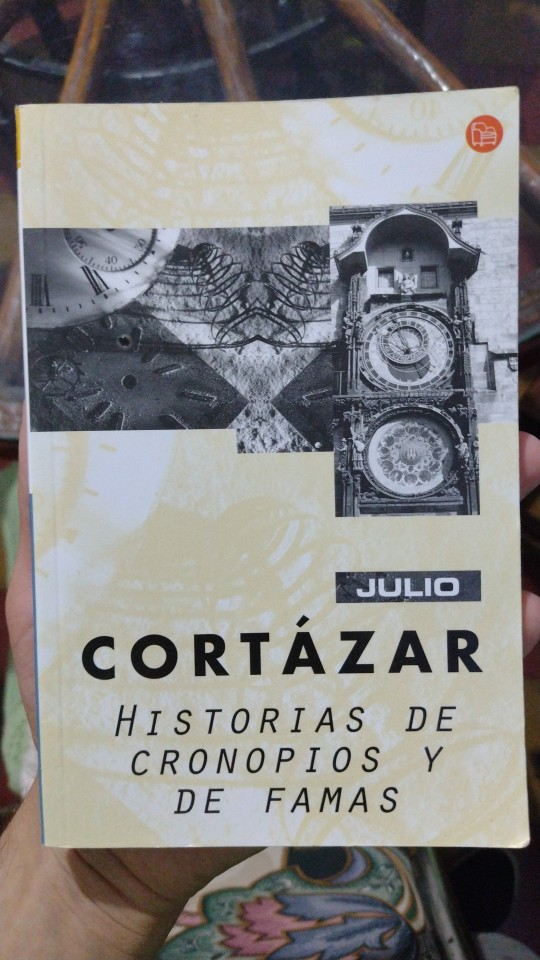
My Review in a Tweet:
Imagine you get a box filled with puzzle pieces, but they are all from different puzzles. You may see a familiar figure here, another face there, but no matter how you try to arrange the pieces together, you are sure it's not the meant image. Reading this book is like that.
My Full Review:
I became aware yesterday of my inappropriate lack of Argentinean authors in my reading list this year, and trying to mend that a little, I found this little book in a bookshelf while visiting my parents for the holidays.
While quite short, this book reminded me how much I ignore. I felt in a clear cultural disadvantage, where Cortázar (who some people may call the greatest Argentinean author) was playing a joke at my expense. I don't say this negatively.
Historias de Cronopios y de Famas is a collection of short stories, vague poems and... Nonsense. That's when the ignorance I felt started to creep in. I'm not sure of the exact literary current Cortázar belongs to, but this book read to me like an absurdist ramble without crossing over to dadaism.
I tend to believe that there are some clear themes of social and economic classes coating the short stories of the Cronopios, the Famas and the Hopes: they work as fictional and bizarre versions of Argentina's middle-to-low, high and (cultural) elite class respectively (I'm not sure about the Hopes). Cronopios are despised and treated condescendingly by the Famas, mocking their behavior and traditions, all too jovial and effusive and lazy; the Famas think too high of themselves and tend to use and abuse the other two; the Hopes seem to be trapped in an academic gasp, stunned by the lack of refinement of the Cronopios.
Even the short stories not directly related to the Cronopios and Famas act as a display of Argentina's idiosyncrasy, helped by the explicit mention of some elements, some places of this country (and more specifically, from Gran Buenos Aires).
But you have to remember that none of the stories really make sense. They are almost poetical, oneirical, nearing the realm of magical realism, very popular in Latin America.
The narration and writing themselves demand a lot of the reader's attention and time, forcing them to engage with the book to find some sense.
Again, I say all of this in a positive light: it's a challenging book in almost a literal sense, it presents itself innocently, like a bunch of nonsense, but soon you start to feel like there's something more underneath, like if under this outer coat of surrealistic and abstract tales laid a more tangible and grounded coat of the same color, merely a different tone but same color nonetheless.
I'm not sure how well this book would be received by non-argentinian or non-spanish speaking persons, but it's a good book anyways.
7,5/10.
My Other 2023 Readings.
#cortázar#julio cortázar#my 2023 readings#book review#book reviews#2023 readings#my readings#argentinean authors#argentinian authors#my book reviews#My Reviews
1 note
·
View note
Text
Examples of Spanish Gender Neutral and How to Use Them
This isn’t exactly a Spanish lesson on pronouns so much as it is a couple popular neopronouns and how to pronounce them. Also all of these should be portable to Portuguese but I’m not very familiar with Portuguese.
Super Short Pronoun Refresher
I’m more of a math person than a language person, so I’m not going to try to teach Spanish 1 here, but as a general rule of thumb, most adjectives have a -o, -e, or -a at the end to denote gender.
Additionally, there are the generic he and she pronouns: él and ella. You can also use “lo” and “la” with an adjective as direct objects. Indirect objects are “le” and “se”.
So to say “he is my nephew”, you would say “él es mi sobrino”.
A lot of words like “yo” “suyo” “tú” are already gender neutral. The only notable change that needs to be made is during third person adjectives.
-e
Starting with my personal favourite and probably the easiest, a lot of Californian Hispanics have started using -e. The argument is that -a -e and -o are all strong vowels and that many words like “triste” already have a -e, so it’s an easy change.
So the appropriate change would be “elle” and “le” with -e. So the gender neutral version of “he is my nephew” is “elle es mi sobrine”.
This does unfortunately have a clash of “le” direct and “le” indirect as well as many existing words that end with an e in Spanish default masculine.
-x
This one is very popular in the United States and Canada and is very similar to the [x] denote.
I highly recommend not treating the -x literally to be pronounced like -equies but instead as a shorthand for -ex like “experiencia” or you will be tripping over your words.
So the appropriate change would be “ellx” and “lex” with -x. So the gender neutral version of “he is my nephew” is “ellx es mi sobrinx”, which is pronounced more similar to “ellex es mi sobrinex”.
Latin Archeo-Pronouns
These are far less popular than -e or -x but I’ve also heard -um and -ea suggested as options.
For -um you would say “ellum” and “lum”. This would then be “ellum es mi sobrinum”.
For -ea, you would say “ellea” and “lea” according to the latin “they”. This would be “ellea es mi sobrinea”.
Since neither of these sounds are used a lot in Spanish, they take a little more time to get used to.
——————
So now you have a bit more familiarity with some gender neutral pronouns in Spanish that are currently being used. There are a lot of different wiki pages and articles on a couple different suggestions with a lot of examples. I personally suggest the nonbinary wiki page on gender neutral Spanish pronouns.
13 notes
·
View notes
Note
Hi hello!!
Its the anon who sent an ask about sharing the origins of my favourite slang term in portuguese :b it took a few days to send this because this is actually the second version of this text, i wrote the first one directly in your ask box and i poured my heart and soul into it and then tumblr crashed and deleted everything and it was so frustrating i needed a good day or two to get it back together lol
With that said!!
I want to preface this by clarifying that this isnt etymology of the actual natural word (thatd be boring and you can look it up on google, latin origins and whatnot), this is more like an explanation in detail to how the natural word came to be its slang version. Though, Ill have to get a bit into the grammar to try to explain the nuance of this branch of portuguese, nothing too much but yknow, be prepared
Also! I havent found anything online detailing this explanation, and due to the everchanging nature of language and its dependence on word of mouth to evolve, there is no way to credit what im about to say, this is all from my own personal experience as a brasillian and asking around about it to people that use the term.
Okay!! With that out of the way!!
One of the things that differs portuguese and other romance languages from english is that our verb conjugation not only varies with the tense youre speaking, but also with what personal pronoun youre using. As far as i can remember rn, in english the conjugated verb only changes based on pronouns in the case of the verb to be ("is/are" changes based on pronoun) or when its conjugated in the third person singular simple present (when conjugated for he/she/it the verb gains an "s" ex. I sing -> she sings). In portuguese the verb conjugation changes every pronoun and every verb tense. Okay. Cool.
The relevant verb for this is the verb "ser", the portuguese translation of the verb "to be" specifically when it refers to a permanent state of the self or to atribute a quality to the subject. More specifically the relevant conjugation for this is the third person singular present "é".
It can also be used in the second person plural present informally, so its used very very frequently, like, you can imagine by how often you use "is" to talk about someone else on a regular basis yknow. What im saying is that "é" is used a lot okay you get me
So, as youve definetly noticed, "é" uses a diacritic, its no big deal really, portuguese uses a lot of diacritics, more than spanish and french definetly, so when you grow up typing in portuguese you learn to type with them. Its just. A tiny bit awkward you know. Bc like, it takes a second more to type them, and it really throws you off your rhythm yknow? But like its okay, its okay, as any lazy brasillian can tell you, the solution is easy! When we dont want to take the time to type the diacritics we type without them and pick the suggested autocorrect version with the diacritics and it fixes the word!! Great!! Very handy!!!
"But where are you getting at anon?" The rethorical and hypotetical version of you asks, "it seems like it works, everything ties up neatly, and you havent even said what the slang term we're getting to is!!" Well reader im getting there okay, have a little patience, for you see, things do NOT tie up neatly, far from it actually.
Well, you see, preference for the autocorrect is determined by frequency, so if you type without the diacritics and theres more than one word that can only the diferenciated by the diacritics the autocorrect is going to suggest the version of it that is used most often right? Like, that makes sense, great! Cool!! Lucky for us "é" is used very frequently, right? Theres no other word with priority over that, right?? Right..??
Let me introduce you to "e", the portuguese translation of "and". You know where im going with this. I dont think theres any word used more often in any language than its version of "and". Like. Thats not even a question i dont think. Idk idk i dont have any sources its just my gut feeling about this. The point is that "e" is used more often than "é" so the autocorrect thinks you wrote it correctly and probably wont suggest the version with the diacritic for you to correct yourself.
Now. You can surrender yourself and just type "e" and hope the person you sent it to can guess that you meant the verb and not the conjunction. But thats a risk youll have to take, and also its a pretty bad look yknow, people might even think you dont know the difference! That would be terrible!!
So what are lazy brasillian people like me supposed to do?? Waste a second typing the diacritic manually??? Be seen as dumb?? Oh.. woe is us... for we cannot express ourselves clearly and fast... life sure is terrible... ;-;-;-;-
Wow this got very dramatic very fast huh, okay okay, lets de-stress a little from all of that grammar and all of that drama with a fun fact okay? Yeah that sounds fun :b
Are you familiar with the concept of a homonym? Its has multiple meanings, but for the purposes of this fun fact the relevant meaning of it is "when two (or more) words have the same pronunciation but two distinct meanings and spellings". Thats cool right? I think homonyms are really fun! But also im a nerd so my definition of fun is... questionable... but regardless!! We talked a bit about diacritics right? Did you know that the portuguese word for diacritic ("acento") has a homonym? Yep! And it means seat ("assento")!! Isnt that so cool?? Like when talking to someone you can only rely on context to know if theyre talking about a funny little symbol or about a bench!! Very cool yep yep :b
Yes, that fun fact helped de-stress from my being-too-lazy-to-type-a-diacritic predicament, i feel better now. You know what makes me feel even better? The fact that i tricked you!! Muahahaha!! That fun fact was just a ploy!! A writing device to make the explanation seem engaging while also giving you relevant information!! Yess!! You fell for my trickss!!! >:3
Okay okay, ill explain, i swear this is getting to the end okay itll be just a little bit longer if youll indulge me.
The trouble we, hypothetical lazy brasillians, had is the following: we need to find a faster way to type "é" in such a way that differs it from "e" and leaves it clear the word and pronunciation is different.
Heres something to think about: "é" is composed of "e" + the diacritic ´, or... heheh... if we want to be funny with it, "é" is composed of "e" + the seat ´. See what i did there? Heheh i used the homonym!! I told you it was fun!! Oh, if only we could just put the "e" in a little chair... thatd be funny and also itd indicate the diacritic... but alas... there is no way to simply draw what you type... and no letter could represent a chair... or... could they..???
Heres a solution: have you ever seen those little middle school jokes about how "h" kinda looks like a chair from the side? No?? Well it doesnt matter, but you see what im about to say right? Thats the solution!! Thats what we'll do!! We'll just type the "e" with a little chair beside it!! Problem solved!!!
Heres my favourite typing slang term in portuguese: "eh"
I just love it so much, its so simple yet so whimsical yknow?? Everytime ive asked someone why we started typing "é" like "eh" the only reason anyone i asked could find is because it has a little chair!!! And okay theres no way of being sure this was the original thought process since the evolution of "eh" isnt documented anywhere i could find since its very informal speech. But like!! Its such a sweet explanation that even if isnt the original intent i still choose to believe it is yknow??
I love my little word that comes with a chair!! I love the little in-jokes that language ends up incorporating into itself as it evolves!! I love how silly it is and how prople just thought "oh thats cute and also convenient" and just adopted it into their speech patterns!! God linguistics makes me want to cry from happiness sometimes!!! *slaps the roof of language* this bad boy can fit so much love and care and sillyness and community in it!!
Anyways yeah thats it, thank you for indulging me and for reading all of this, i know its a lot lmao. Your slang project is genuinelly so cool and i saw everyone sharing their little manneirisms and regional variations and it made me so so so happy!!! I hope you enjoyed reading this as much as i enjoyed writing it :D and i hope you have a great timezone wherever you are <3
wow anon thanks !!!! thats a very cool story for the origins of a slang. i love that languages are ever changing in meaning and form. sorry that you had to retype this again but i am grateful you did.
its really fun to learn about the nitty gritty details of different languages and the cultural significance at which they come from. i dont think it would have been possible for me to learn the origins of eh without you sharing it with me !
i started the project cause i was learning spanish and remembered that online messaging can be a completely different world than what we learn on textbooks.
languages are symbolic of how different and varied human beings are and thats why i love learning about it. thanks again for sharing this with me and i hope you enjoy your day !
1 note
·
View note
Text
OC Name meanings
tagged by @randomstupidchaos
okay, so I think we all know that I primarily write a bunch of fanfic. so a lot of my characters come pre-built with names. there are several that I came up with myself, but if I only listed those names, it wouldn't even look like my book anymore, so I'm gonna define all of them anyway. (except for Malroth. I have little idea what his name means or where it comes from. it's not even his name from his starting language. who knows!)
that said I do have ONE original story (I have not worked on it in so long agh) and I will do that one at the end.
Builderverse
Crea- short for Create. stole it from the tutorial lmao.
Aris- short for Arisplotle. who is a slime. dragon quest has a thing about slimes having pun names, you know? (granted in maskverse I named him Aristaeus, which he hates, and it means some variation of "best" because he's the best boy.)
of note, in Maskverse specifically, "Malroth" is a nickname he made up for himself that he could use while in hiding as the prince so no one could sus him out. his first name is Troy. this is because his mom is Hellen and I thought it would be funny. Hellen of Troy from illiad fame is now Troy of Hellen in my story. (it's really not that funny, is it?) (yes this is basically the sole reason I made Hellen from the game his mom for the sake of the story. good times!)
of the main builders cast I'm mostly interested in Rosie (self-explanatory since she's a gardener), Babs (comes from Barbara which means stranger), and Anessa. From the (weirdly few) posts I can find about this name, Anessa is short for Agnessa, which is another form of Anges. in Greek, Agnes is pure/holy/chaste/satisfaction (everyone gives a different one lol), which I find interesting given her role in the story.
of other interesting note, Warwick can mean from the settlement by the weir (which I guess is a dam), but it also can mean "strong leader who defends". personally I think they went with his name because "war" is in it and hi that's what his island is known for.
Ludovic itself means Famous war/battle, but I chose it because the Spanish version of builders named Warwick "Ludovico" and I needed another antagonist.
Damara is Greek for "gentle" which makes sense cos she was created to be a mentor character. ended up later adopting Malroth but she lended well to it XD
Griswold- english was grey forest or grey land, french it was a ruler with grey hair (which is kinda weird because in game he is VERY bright blue). that said, I think they picked it because it kinda sounds like gristle, which is related to bone, which he is a skeleton.
Floria- flower. just thought it's fun to have a hypercompetent soldier be named Flower because her parents wanted her to be a nice proper lady. (she said fuck that.)
that's all that's coming to mind on that.
Sirens
Patrick- nobleman (english)
Jonathan- God has given (hebrew)
Scotia- person from Scotland (english) (she's not Scottish tho I just liked how it sounded)
Troy- footsoldier (greek) (don't ask me how I got two of these)
Easton- from the east (he arrives to the story from far away)
Brinda- from the basil plant (india) (again I liked the sound)
Kurt- courteous (american) (it's funny because he's overtly sarcastic with everyone but Brinda and then he turns into a teddy bear. only Patrick ever sees it tbh)
Felice- fortunate/happy (latin)
Tahlia- morning dew (hebrew). also because my dad always joked about naming me Talitha so I played with the letters.
Sera- shortened from Saraphim, which is an angel (something latin related)
I have other characters that only appear in book 2, but given I haven't touched that story since 2014-2016, I don't think it's going anywhere enough to bother listing here.
2 notes
·
View notes
Text
Mount and blade warband mod download

#Mount and blade warband mod download full version
#Mount and blade warband mod download full
What is the current state of the Early Access version? Throughout the course of the early access period we intend to introduce the missing supporting features, such as, rebellions, kingdom creation and weapon crafting, while expanding and enhancing many of the existing features that are outlined below.” and may lack localizations for some languages. The early access version will be reusing scenes for different towns, may lack some supporting features, may have a limited number of quests, voice-overs, etc.
#Mount and blade warband mod download full
While the early access version is very much stable and playable, players can expect to run into some obscure bugs and other issues while playing that we intend to locate and fix before the full release. “The early access version of the game contains a wealth of content that will keep players engaged for many hours.
#Mount and blade warband mod download full version
How is the full version planned to differ from the Early Access version? Our focus is on ensuring that the game is fun and enjoyable rather than imposing a deadline that might have a negative impact on the final product.” “While we do not have a set date for a full release at this moment in time, we expect that the game will be in early access for around a year. In this case, please consider adding the game to your wishlist and you’ll receive an email when we release the full version.”Īpproximately how long will this game be in Early Access? Of course, you may prefer to wait a little bit longer and hold off until the final, finished product. These include but are not limited to: full game controller support, some skill and perk effects, crafting, some aspects of sieges, and clan, army and kingdom management.ĭeveloping M&B Bannerlord has been, and continues to be a fabulous experience for us, and we are excited to be walking the final phase of this journey together with our players. Singleplayer Features: Several planned single player features may be missing or incomplete. Multiplayer modes and features: The game currently supports several popular multiplayer modes, but we are planning to add more modes and features, possibly including ranked matchmaking. During EA, localizations for these languages may be missing entirely or may be incomplete. Localization: Our current plan is to localize the game into the following languages: French, Italian, German, Japanese, Korean, Polish, Brazilian Portuguese, Russian, Simplified Chinese, Spanish (Latin American) and Turkish. It will of course be a priority to fix these. Savegames: We will strive to keep savegame compatibility during EA, however it may be technically infeasible to provide 100% backward compatibility in savegames and you may occasionally have to start a new game after updating to a new version.īugs and glitches: Although we strive to create a stable game experience, the game will be actively developed during early access and hence there will be a greater chance of bugs and glitches creeping up. Some of these planned voice overs may be missing or using placeholder versions during EA. Voice overs: Since the game uses a lot of dynamic text and hundreds of NPCs, we are planning to record voice-overs for only a limited subset of the dialog (greetings, companion introductions and main quest). Parts of the game may be too easy or too hard. Quest Content: A portion of planned quests may be missing entirely, and those in the game may be using placeholder maps, animations, etc.īalancing: Various aspects of the game may be poorly balanced. Unique Maps for Towns, Castles and Village: Although we plan to create unique maps for every town and castle in the game, it is a rather arduous process to create that many well designed maps and as such, different locations may share the same map during early access. Here are a few aspects you may need to know: However, due to the nature and scale of game that we have envisioned, there may be various problems or missing features and content during the course of early access. We are hoping to run a productive and efficient early access for M&B Bannerlord as well. These past experiences have taught us that it is vital to bring players in to help us iron out any issues and refine the game by utilizing feedback to bring it to the level that both our community and we expect. By working alongside our community we were able to deliver a unique gaming experience that players still enjoy to this day. “Early access is something that we are very familiar with: our first title, Mount & Blade, helped to pioneer this method of release back in 2005.

0 notes